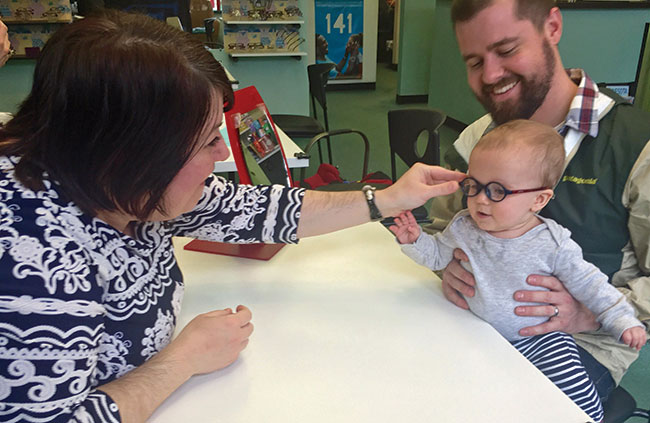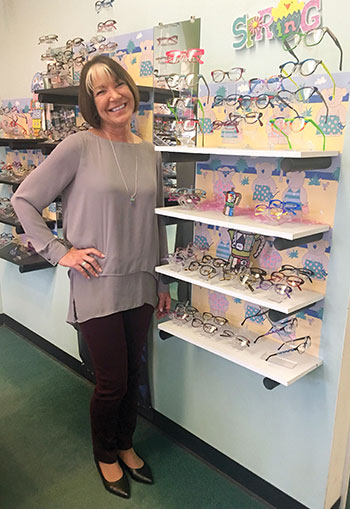
Optician Cindy Iverson of The Glasses Menagerie serves an infant patient.
FEATURED BUSINESS
The Glasses Menagerie
Minneapolis, MN
When Dr. Linda Chous began as a technician in pediatric ophthalmology, she had challenges working with kids but quickly recognized just how life-changing eyecare could be for young patients. Today, Chous’ 25-year-old practice, The Glasses Menagerie, is a pediatric eyecare destination — and one that has established a niche serving developmentally challenged children.— DANIEL J. SMITH
Advertisement
This article originally appeared in the May 2016 edition of INVISION.
THE IDEA: In 1991, four years after earning her degree from the Southern California College of Optometry, Chous opened The Glasses Menagerie in Minneapolis.
“By this time, I loved working with kids and was a new parent,” says Chous, a mother of three.
In the early years of building her own pediatric practice, a colleague asked Chous if she would like to perform full eye exams in some of the area’s public schools, specifically catering to developmentally challenged children the in-school nurses could not properly assess.
“Complete serendipity,” Chous says. “She was leaving the country and wanted someone to take over.”
Chous happily obliged and ventured into a number of local schools to direct eye exams for children facing a range of developmental delays, including those with autism and cerebral palsy. Quickly, she saw the pressing needs these children faced.
Advertisement

Linda Chous opened The Glasses Menagerie in 1991, and soon began to focus on developmentally disabled children.
THE EXECUTION: Chous began networking with occupational therapists and teachers. She presented at professional meetings, visited offices and schools and shared practical information on the visual system and how eyecare could be woven into routine activities.
“It’s all about taking opportunities to let people know what you’re doing and capitalizing on the opportunity to be seen as a thought leader,” Chous says.
Chous was later approached by the Minnesota Department of Education and asked to visit schools around the state with a colleague who specialized in low vision.
“The parents and teachers would be there, as would others working on the children’s care, and we’d discuss how we could address specific problems,” Chous says.
Around this time, Chous also began working with the Special Olympics’ Opening Eyes program, which includes full eye exams, prescriptions and labs constructing glasses for the athletes on site.
Advertisement
THE REWARDS: These collective efforts fueled The Glasses Menagerie’s standing as a provider of care for developmentally challenged individuals.
“When parents of developmentally challenged children find out you exist, more and more start showing up,” Chous says. “These parents have a great network and talk with other parents facing similar challenges.”
On a personal level, Chous says helping this vulnerable demographic has been rewarding.
“So many of these kids have stolen my heart,” Chous says. “It’s phenomenal to be with these kids and watch them bloom into wonderful people and to feel that you’re contributing to their lives in a positive way.”
DO IT YOURSELF
Improve Your Work with the Developmentally Challenged
➤ Be flexible, not only with your exam techniques, but also physically. Often Chous must contort her body into different postures to gain clinical information.
➤ Avoid predetermining what the child can or cannot do. “It’s better to start high and adapt down,” Chous says. “You will learn quickly what the child is capable of.”
➤ Participate in volunteer programs like the Special Olympics to learn about the needs of the developmentally challenged and how to serve these patients.
➤ Be creative with tools and techniques in the exam room. Chous has numerous gadgets to capture attention, such as a character flashlight whose nose lights up.
➤ Judge patients by their capabilities, not their age: What works with most 8-year-olds is unlikely to work with an 8-year-old with developmental challenges.
➤Contact occupational therapists and special education teachers and tell them you are interested in working with developmentally challenged patients.